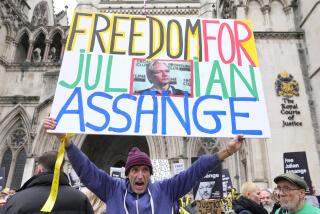U.S. faces challenges trying to charge Edward Snowden

WASHINGTON – Experts said the Justice Department faces challenges in bringing criminal charges against self-proclaimed leaker Edward Snowden but probably was moving as quickly as possible to take the 29-year-old former National Security Agency contractor into custody before he spills additional intelligence secrets.
“He’s a walking treasure trove, potentially, of additional leaks of classified information,” said David Laufman, a Washington lawyer who has previously prosecuted national security cases. “They have reasons to be concerned about him walking around with the ability to disclose more information.”
Justice Department officials have said they are preparing criminal charges against Snowden, who is in hiding in Hong Kong after disclosing details of NSA surveillance programs to the news media, but no charges have been formally announced. On Wednesday, Snowden gave an interview to another newspaper, the South China Morning Post, and said he will fight any attempts to extradite him to the U.S.
“People who think I made a mistake in picking Hong Kong as a location misunderstand my intentions,” he was quoted as saying. “I am not here to hide from justice. I am here to reveal criminality.”
By now, federal investigators probably have executed search warrants to gather computers and digital devices Snowden could have used to access classified information from the NSA, copied his hard drives, searched his workplace and residences, and captured so-called digital footprints to see what materials he viewed and downloaded, experts said.
But because Snowden may be charged with improper disclosure of classified materials, the charges could include information that itself is classified. There are limits on how that can be publicly disclosed in court, which could delay the filing of charges, experts said.
“The approval process of charges of this kind are more involved than other kinds of crimes,” said Jason Weinstein, a former deputy assistant attorney general and a partner in the law firm of Steptoe and Johnson. “There is a lot of consideration given to what portion of the evidence can be used in the courtroom. That makes the process longer. The investigation is probably at a very early stage.”
To get Snowden back to the United States, U.S. authorities could revoke his passport, putting the burden on Hong Kong to deport him. But that opens the possibility that Hong Kong or Chinese authorities – or those in a sympathetic third country – could grant Snowden protected status, complicating U.S. efforts to repatriate him.
But extraditing Snowden isn’t clear-cut, either.
The United States and Hong Kong, a self-ruled part of China, signed a bilateral extradition treaty that took effect in 1998, a year after Britain handed over control of its former colony. Under the treaty, espionage or disclosing classified information aren’t extraditable offenses.
The treaty allows extradition for vaguely defined “computer crimes.” But it also allows Hong Kong to refuse to extradite someone “where there is a political motivation for the offense,” and Hong Kong authorities could decide that Snowden’s disclosures constitute a political statement against U.S. surveillance programs.
The Justice Department’s office of international affairs, which includes lawyers who are experts on U.S. extradition treaties, is probably advising prosecutors on what charges would be recognized as valid under the treaty.
“It’s their job to figure out what charge is most likely to be favorably recognized by the court in Hong Kong,” Weinstein said.
Follow Politics Now on Twitter and Facebook
Twitter: @SBengali
More to Read
Get the L.A. Times Politics newsletter
Deeply reported insights into legislation, politics and policy from Sacramento, Washington and beyond. In your inbox three times per week.
You may occasionally receive promotional content from the Los Angeles Times.











